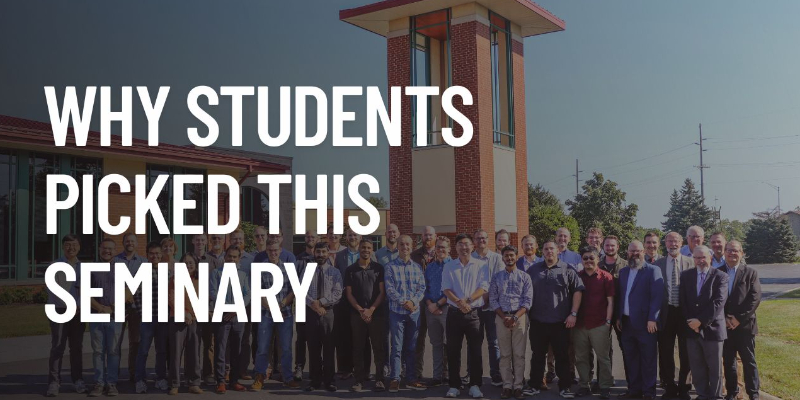
The Importance of Seminary Education
The historic Reformed and Presbyterian Church Orders require, in addition to college or university training for those who would be Ministers of the Word and Sacraments, seminary training for such men, ordinarily a Master of Divinity degree. The M.Div. is the degree that is considered the vocational or professional degree for ministers, similar to a law school degree obtained by one who would be admitted to the bar.
To sample a church order of one of the churches supporting Mid-America, the Form of Government (FG) of the Orthodox Presbyterian Church, as is true of the church orders of the URCNA, PCA, RCUS, etc., requires seminary training for men who would be licensed, declared a candidate, or ordained to preach.
The OPC FG (XXI:3) puts it this way: “It is highly reproachful to religion and dangerous to the church to entrust the preaching of the gospel to weak and ignorant men. The presbytery shall therefore license a candidate only if he has received a bachelor of arts degree, or its academic equivalent, from a college or university of reputable academic standing, and has completed an adequate course of study lasting at least one year and a half in a theological seminary.”
FG XXIII:3 further requires for ordination “an adequate course of study in a theological seminary equivalent to that required for a regular three year theological degree.”
Are the constituent churches of Mid-America Reformed Seminary justified in requiring seminary training for their ministers? After all, where does the Bible say that a preacher needs to go to seminary?
Biblical Requirements
It is true that the Word of God emphasizes the moral and spiritual qualifications for a minister more than it does the natural and intellectual qualifications (1 Tim. 3:1-7; Titus 1: 5-9). These verses do require, though, that a man be “able to teach” and that he hold firm “to the trustworthy word as taught, so that he may be able to give instruction in sound doctrine and also to rebuke those who contradict it.”
Furthermore, Paul admonished Timothy to be “a worker who has no need to be ashamed, rightly handling the word of truth” (2 Tim. 2:15) and to “guard the deposit entrusted to you” (1 Tim. 6:20). A Minister of the Word, then, must be thoroughly trained in the exposition and defense of the Word of God.
Our church orders, thus, reflect an understanding that the necessary skills for preaching the whole counsel of God are ordinarily developed and honed at a seminary. Seminary education alone qualifies no one to preach the gospel. But it does serve as the training ground for those who are called to preach and are recognized as such by the church.
Exceptions Allowed?
Note, as we have, that while these skills are ordinarily attained at seminary, the URCNA Church Order (CO) leaves it to the consistory to assure that the candidate “receives a thoroughly Reformed theological education” (Article 3). One is further directed in that CO to Appendices 1 and 2, the former describing, essentially, what one receives by a seminary education. The URCNA CO does say that candidates must receive an M.Div. degree “or its equivalent” (Appendix 3). The URCNA CO appears, then, to require seminary, one might say, by indirection.
Similarly, the OPC FG recognizes, both in licensing and in ordaining men, that exceptions may be made to the educational requirements (XXI:6 and XXIII:3)—specifically, as to where his education is obtained. But even then, no exception is to be made to the knowledge required in all the Reformed and Presbyterian bodies.
A candidate may have gained that knowledge, for instance, while serving in the pastorate of another denomination that did not require seminary, and he has now become Reformed. In any case, however, the presbytery may never license a man who is “weak and ignorant.”
So even if a man does not have a seminary education, he must have everything that seminary is calculated to give him. He must still pass all the required examinations that take place in the presence of classes, by presbyteries, etc.
The Seminary’s Role
This leaves us with this question: is the requirement for seminary training by our churches for its ministers scripturally justified? I would answer yes. A seminary provides an education in the Bible in its original tongues (in the Old and New Testament departments), in the historical outworking of the Bible (in the church history department), in the topical expression and defense of the teaching of the Bible (in the systematic theology and apologetics department), and in the application of the Bible to the lives of the people of God (in the ministerial or practical theology department).
The seminary curriculum is designed to educate men who will be faithful and able preachers of God’s whole counsel--men who will give their lives to the equipping and edifying of the saints. Another sort of training would be hard to claim honestly to give the comprehensiveness of seminary education.
I would readily admit that this task does not belong solely to the seminary. In fact, the seminary is but a servant of the church and is to assist her in equipping men for ministerial service whom the church deems suitable for sacred office.
Before Seminaries
The seminary as we know it today is not of ancient origin but came into existence in this country in the early national period, with Princeton Theological Seminary being the first in the Presbyterian Church (1812). The first two professors at Princeton—Archibald Alexander and Samuel Miller—were ministers with pastoral experience. From the beginning, the ideal at Princeton was to have prospective pastors taught by men who were themselves pastors. With Charles Hodge, Princeton began to employ men without pastoral experience, though they required all their professors to be ministers. When the Continental Reformed churches started seminaries, such as Calvin Theological Seminary (1876), they consistently required their professors to have some pastoral experience.
Before the rise of the seminary, men were trained for the ministry at the university. In this country, Harvard was founded in 1636 and Yale in 1701, primarily to train men for the gospel ministry. Many who went to college then were already schooled in the classics, the humanities, and the sciences. Even the “Log College” of William Tennent and the classical academies started by his students (which led to the founding of The College of New Jersey in 1746, later Princeton University) offered an education comparable to the New England and European universities: Latin, Greek, Hebrew, divinity (theology), rhetoric, logic, ethics, metaphysics, mathematics, and natural philosophy (science).
All this is to say that before the advent of the seminary, the necessary education was attained in the university or in the classical academy. What is important is that it be attained. While seminaries themselves may be a more recent innovation, what is taught in the seminary (and no longer in the university) today is what Reformed and Presbyterians have always recognized as essential for ministers.
The Need for an Educated Ministry
It’s this simple: the church has understood the Scriptures to require that ministers be able to handle the Word of God effectively, to teach the truth with all its implications, and to refute errors of all kinds. Those who have been called to such ministry—such as pastors and seminary professors—can well testify that one cannot have too much knowledge to carry out their calling.
Generally, men in the pastorate bemoan their lack of time for study. I have never heard anyone complain that he has spent too much time studying the Bible, theology, missions, evangelism, or the history of the church. If you really understand the pastoral calling, you know that you need all the theological education that you can practically get.
Seminary affords men the opportunity to acquire the foundational understanding upon which they will build throughout their pastoral lives, including how to think biblically and theologically. If a man never goes to seminary, he may have to spend much time catching up with his better-informed ministerial colleagues. Most men would not even know what the important issues are and how to address them, apart from seminary training. If men with a seminary education sense their insufficiency for pastoral ministry, how much more so those who have never attended seminary?
Since seminary is the ordinary route, only an extraordinary man can dispense with it. And who is that? Or, rather, who thinks that he is that?
Beyond Seminary
As noted above, seminary, at least the classroom, is not calculated to provide all that a man needs to serve in the gospel ministry. A man also needs good practical field experience. Churches and seminaries have come to recognize this and thus require or recommend various ministerial apprenticeships and internships (the PCA ordinarily requires a year-long internship for its candidates). In the past, a ministerial candidate would live for several years with a pastor and gain in that way many of the counseling, visitation, administrative, and other pastoral skills that can only be gained in the field and that the best of seminary programs can only begin to provide.
There is, in other words, only so much that can be done in the seminary classroom. No matter how many counseling courses a man may take, for instance, he will never learn what can only be learned by counseling parishioners. Thus, Mid-America’s Ministerial Apprenticeship Program, about which we’ll say more next time.
This is not to say, though, that seminaries cannot do a better job teaching things like denominational history, worship, and polity (church government), all of which need to be part of the seminary curriculum. The URCNA CO requires the preaching of catechism sermons, and seminaries customarily have no instruction about such. Mid-America does, as well as history, polity, etc.; more on this and other Mid-America strengths next time.
But Which Seminary?
While it is not inconceivable that ministers could receive their training in the Bible somewhere other than at seminary, I do not know where comprehensive, thorough training in all the theological departments occurs other than at seminaries and similar theological schools.
However, not any seminary will do. Since all ministers are called upon to “guard the deposit entrusted to you,” a ministerial candidate should seek out a thoroughly confessional seminary—that is, that guards the theological trust that Christ has given to His church.
No man should attend a seminary that does not confess Christ in all His fullness, manifested in part by its fidelity to the Reformed and Presbyterian confessions. The seminary should be dedicated to training men for the gospel ministry in the fullest sense of that task. Next time, I will develop more fully why Mid-America especially fits that bill and why all considering seminary should give Mid-America their most serious consideration.
Finally, as John Donne said, “No man is an island.” Men preparing for the ministry need to learn collegiality in the seminary to prepare them to work in church courts.
Thus, we see that a seminary education is a necessary and important part of pastoral training today.

Dr. Alan Strange serves as the Interim President and Professor of Church History at Mid-America Reformed Seminary.
Recent articles




